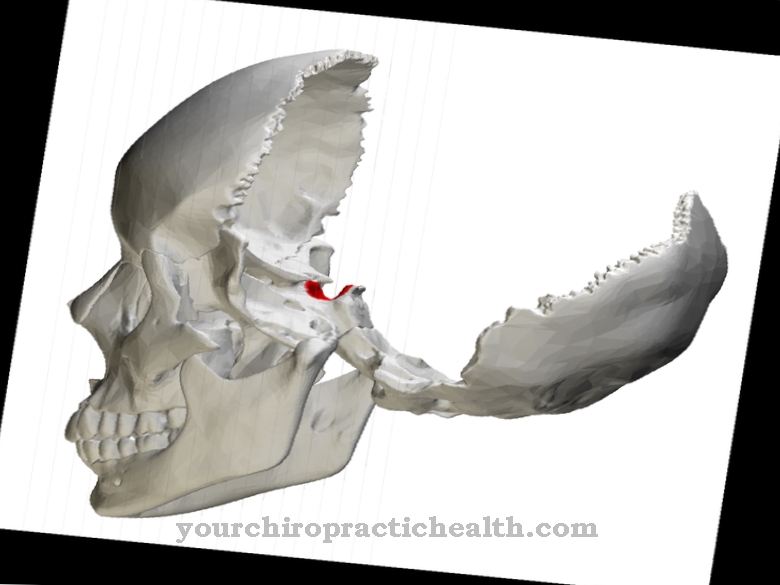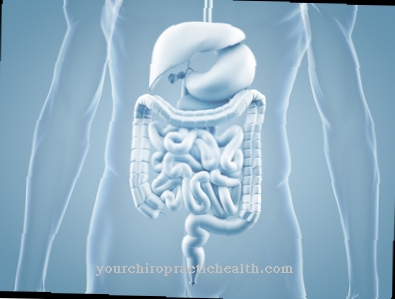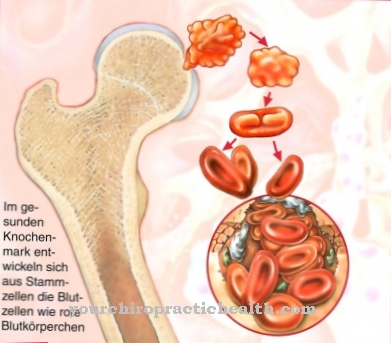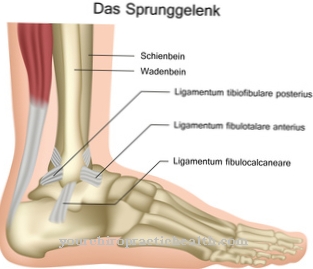Although the frequency of bowel evacuation varies from person to person, constipation can quickly lead to health problems. If there is no stool for a long period of time, in extreme cases the feces are transported back into the stomach and vomited from there.
This is the case, for example, with an intestinal obstruction. If the intestinal wall can no longer withstand the pressure of the intestinal contents, the excrement pours into the abdomen and leads to life-threatening infections there.
What is constipation prophylaxis?

The Constipation prophylaxis includes all measures that serve to prevent constipation. It occurs when the bowel is not emptied every 3 days at the latest or when excessive straining is necessary when defecating.
It is also associated with a hard lower abdomen and pain when pressure is applied to the lower abdomen. If the breath smells of feces or if there is vomiting of stool, immediate medical intervention is necessary (suspected intestinal obstruction!). Constipation prophylaxis is intended to promote natural bowel movement and ensure more frequent bowel movements, so that the general state of health of the patient / person in need of care improves. Before initiating it, it should be checked what the cause of the constipation is.
Certain medications are to blame for some patients. Sleep, sedatives, and pain relievers often inhibit digestion. In the case of those in need of care and hospital patients, there is often the added shame of having to poop in a bedpan or to go to the toilet next to their fellow patients. After an abdominal operation without an endoscope and with disturbed fluid and electrolyte balance, there is also often restricted bowel movements.
Conditions such as paralysis, Parkinson's disease, hemorrhoids, colon cancer and depression can also cause constipation. Constipation prophylaxis includes a variety of measures. Laxatives should only be administered when natural remedies do not achieve the desired result.
Function, effect & goals
The aim of constipation prophylaxis is to counteract (chronic) constipation. Sometimes just a few measures are sufficient to promote bowel evacuation.
As a general rule, the patient should drink at least 2 liters of fluid a day to soften the stool. Sufficient exercise also promotes natural bowel movement. A fiber-rich diet leads to a larger volume of feces and stimulates peristalsis. This includes whole grains, nuts, vegetables, and fruits. It is essential to drink a lot with these foods as they swell up. It is also advisable to always have enough time to defecate: If the person concerned feels pressure in their abdomen, they should go to the toilet immediately, since deferred bowel movements lead to the hardening of the intestinal contents.
It is best to get used to a regular toilet time. A regular rhythm of life and meals that are always taken at the same time also help. Flaxseeds, Indian flea seeds and wheat bran, which are taken with plenty of fluids, also have a supportive effect. If the constipated patient is unable to do without digestive drugs, it is advisable to take a mild laxative in low doses. The special measures to evacuate the bowel include warm, moist abdominal compresses, abdominal exercises, deep abdominal breathing and intestinal massages.
The abdominal press is performed 5 times in a row after waking up: the patient pulls in the abdomen for 10 seconds and then slowly expands it again. In the colon massage, the patient / carer who is lying down massages the large intestine for 5 minutes, starting on the right side of the lower abdomen. If these special constipation prophylaxis measures do not help either, oral laxatives or suppositories must be administered to the patient / person in need of care. Alternatively, an intestinal enema or - in very severe cases - an intestinal evacuation can be performed.
You can find your medication here
➔ Medication for constipation and intestinal problemsRisks, side effects & dangers
Constipation can be a symptom of a serious illness if constipation occurs when the person has a regular life with a healthy diet and sufficient exercise.
Therefore, the person concerned should consult a doctor they trust as soon as possible. The risk of chronic constipation is particularly high in people with limited mobility (the physically handicapped, bedridden). For them, the nurse should ensure that the bowel is emptied as often as it was before hospital or home admission. The stool should also be checked regularly for abnormalities in color, consistency and possibly composition. Overflow incontinence - small feces and amounts of mucus leak out of the intestine in an uncontrolled manner - should be avoided at all costs.
Other signs of chronic constipation may include bad breath, a sticky tongue, and loss of appetite. It becomes particularly critical if the breath smells of feces or if you vomit feces. Then the emergency doctor should definitely be called. For residents who can still move independently, constipation prophylaxis usually consists of informing them about which foods they should avoid and which they should prefer to eat to prevent constipation. Caregivers should make sure that patients do not "forget" to drink plenty of fluids - which is common in older people - and encourage them to use the toilet regularly.
Toilet training done at the same time each day helps to think about the necessary bowel movements. With immobile patients, mobilization can take place in bed (abdominal muscle training, bed gymnastics). People with restricted mobility and patients who frequently "forget" to drink should not be given flaxseed, Indian flea seeds or wheat bran, as they would otherwise promote constipation. Instead, it is recommended to add yogurt, buttermilk, crushed prunes, and lactose. This sweetens the food and has a laxative effect at the same time.

























.jpg)

.jpg)
